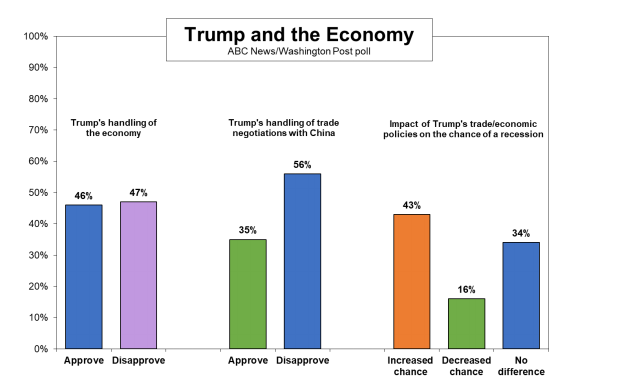

Six out of 10 Americans believe a recession is likely in the next year as most people are concerned about price hikes due to the trade war with China, according to a recent ABC News/Washington Post poll.
The poll also showed that U.S. President Donald Trump's approval rating fell from 44 percent in July to 38 percent in September.
As for the handling of economic issues, approval dropped from 51 percent in July to 46 percent. Only 35 percent agreed with his China-U.S. trade negotiations policy, and 60 percent worried commodities prices would rise.

Trump and the U.S. economy. /Photo from ABC News/Washington Post poll
In general, 56 percent hold positive attitudes toward the U.S. economy, down from 65 percent last November, according to the poll. Sixty percent see a recession as very or somewhat likely in the next year, which is within sight of the 69 percent who said so in November 2007, in advance of the Great Recession.
Economic attitudes have a close connection to Trump's overall job performance rating. The president only received a 20 percent approval rating from those who see a recession as likely and 19 percent from those who are concerned the trade dispute with China will drive up costs, according to the poll. For those who are less pessimistic about the economy and the trade dispute, the ratings are 50 and 51 points higher, respectively.
In addition, a survey by the National Association for Business Economics (NABE) indicated that over 70 percent of the economists surveyed believe the U.S. economy will slip into a recession before the end of 2021.
A slew of U.S. economic data also signals the country is likely heading for a recession. U.S. economic growth slowed to 2.1 percent in the second quarter, down from 3.1 percent in the first quarter, and the slowest pace in more than two years.
The U.S. manufacturing sector contracted in August for the first time in three years, according to the Institute for Supply Management (ISM).
Data from the Congressional Budget Office (CBO) in August also showed that the U.S. national debt is growing faster than expected and will hit 960 billion U.S. dollars for the 2019 fiscal year, which ends September 30, and 1 trillion U.S. dollars for the 2020 fiscal year.

Copyright © 2018 CGTN. Beijing ICP prepared NO.16065310-3
Copyright © 2018 CGTN. Beijing ICP prepared NO.16065310-3